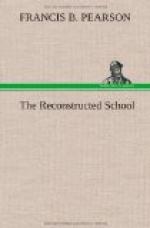We who are indulging in dreams of the brotherhood of man must enlarge our concept of society before we can hope to have our dreams come true. It is a far cry from society as a strictly American affair to society as a world affair. The teaching of our schools has had a distinct tendency to restrict our notion of society to that within our own national boundaries. In this we convict ourselves of provincialism. Society is far larger than America, or China, or Russia, or all the islands of the sea in combination. It may entail some straining at the mental leash to win this concept of society, but it must be won as a condition precedent to a fair and just estimate of what the function of education really is and what it is of which the schoolhouse must be an exponent. Society must be thought of as including all nations, tribes, and tongues. In our thinking, the word “society” must suggest the hut that nestles on the mountain-side as well as the palace that fronts the stately boulevard. It must suggest the cape that indents the sea as well as the vast plain that stretches out from river to river. And it must suggest the toiler at his task, the employer at his desk, the man of leisure in his home, the voyager on the ocean, the soldier in the ranks, the child at his lessons, and the mother crooning her baby to sleep.
We descant volubly upon the subjects of citizenship and civilization but, as yet, have achieved no adequate definition of either of the terms upon which we expatiate so fluently. Our books teem with admonitions to train for citizenship in order that we may attain civilization of better quality. But, in all this, we imply American citizenship and American civilization, and here, again, we show forth our provincialism. But even in this restricted field we arrive at our hazy concept of a good citizen by the process of elimination. We aver that a good citizen does not do this and does not do that; yet the teachers in our schools would find it difficult to describe a good citizen adequately, in positive terms. Our notions of good citizenship are more or less vague and misty and, therefore, our concept of civilization is equally so.
Granting, however, that we may finally achieve satisfactory definitions of citizenship and civilization as applying to our own country, it does not follow that the same definitions will obtain in other lands. A good citizen according to the Chinese conception may differ widely from a good citizen in the United States. Topography, climate, associations, occupations, traditions, and racial tendencies must all be taken into account in formulating a definition. Before we can gain a right concept of good citizenship as a world affair we must make a thoughtful study of world conditions. In so doing, we may have occasion to modify and correct some of our own preconceived notions and thus extend the horizon of our education.




